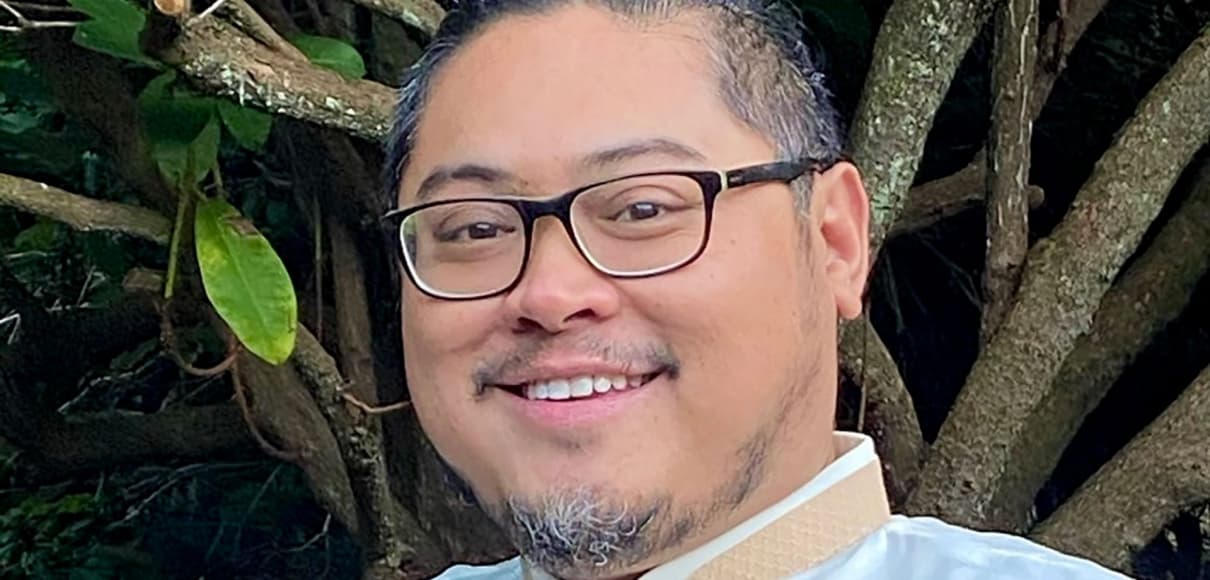Conrado Julian never would have pictured himself as a graduate student in education. His parents fled the Philippines after World War II, and the family struggled to survive in the U.S.
 “My father was an assembly line worker and we lived in our van, parked outside the factory,” Julian said. “We bathed at public showers on the beach and ate the fish my dad caught, along with government rations.”
“My father was an assembly line worker and we lived in our van, parked outside the factory,” Julian said. “We bathed at public showers on the beach and ate the fish my dad caught, along with government rations.”
Eventually Julian’s family moved into a small house, but he spent most of his time away from home. “I was a teenage couch surfer, drinking and smoking weed. If I did attend school, I was never in the right classroom, but the teachers felt it was better to have me in the wrong class than out on the streets.”
His school counselors recommended vocational programs, and Julian began working for school credit. He found employment as a dishwasher and waiter, earning enough to feed his brother and pay the electric bill when it got shut off. “There was a lot of pressure to become a laborer, and there wasn’t much talk about college as a possibility. But one day a teacher asked me, ‘What do you want to be?’”
Julian said he wanted to be a teacher. “I didn’t even know you had to go to school to become a teacher. Higher education never seemed like an option for me.”
Eventually, Julian turned things around and married and started a family. With encouragement from his wife, Julian earned a teaching degree. When they started looking into schools for his son, Julian began to realize how different education looked for kids from poor families. His son was offered a scholarship at a private school, and Julian was shocked at the contrast with the public school he had visited.
Using what he’d learned about ACEs — adverse childhood experiences — Julian taught students how to identify their feelings and self-regulate so they could stay in their seats and engage in schoolwork.
“At the private school, the principal knew every family. Teachers greeted the students, and students greeted them back. Parents were milling around, involved in the school day. It felt like family — everyone in warm relationship. But at the public school, I saw parents dropping off their kids and pulling away. At the time I didn’t understand the reasons for that. But my first thought was, ‘I want every child to have what the private school children have.’”
That inspiration led Julian to enroll in SPU’s MEd program in Teaching, Learning, and Leadership, a two-year master’s degree that prepares teachers to serve as peer coaches, mentors, department chairs, staff development leaders, or curriculum coordinators. The program focuses on the quality of education, and the courses caused Julian to reimagine his own instructional practices with students, especially those impacted by childhood trauma. Too many disadvantaged students, Julian observed, dropped out of school and became caught in behaviors that put them on a direct path into the juvenile detention system.
“I started thinking about the school-to-prison pipeline that we see in black and brown communities, and I felt conflicted about our traditional approaches. Think about sending a troubled kid to the hallway or disconnecting a child from virtual school as a disciplinary measure. The message has been: ‘We’ll send you away.’ And what is that teaching?”
Using what he’d learned about ACEs — adverse childhood experiences — Julian taught students how to identify their feelings and self-regulate so they could stay in their seats and engage in schoolwork. He promoted “time travel” exercises in which students visited community colleges and universities, so they could visualize themselves in a higher education setting.




